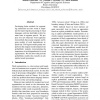Free Online Productivity Tools
i2Speak
i2Symbol
i2OCR
iTex2Img
iWeb2Print
iWeb2Shot
i2Type
iPdf2Split
iPdf2Merge
i2Bopomofo
i2Arabic
i2Style
i2Image
i2PDF
iLatex2Rtf
Sci2ools
108
click to vote
ACL
2006
2006
Contextual Dependencies in Unsupervised Word Segmentation
Developing better methods for segmenting continuous text into words is important for improving the processing of Asian languages, and may shed light on how humans learn to segment speech. We propose two new Bayesian word segmentation methods that assume unigram and bigram models of word dependencies respectively. The bigram model greatly outperforms the unigram model (and previous probabilistic models), demonstrating the importance of such dependencies for word segmentation. We also show that previous probabilistic models rely crucially on suboptimal search procedures.
Related Content
| Added | 30 Oct 2010 |
| Updated | 30 Oct 2010 |
| Type | Conference |
| Year | 2006 |
| Where | ACL |
| Authors | Sharon Goldwater, Thomas L. Griffiths, Mark Johnson |
Comments (0)

